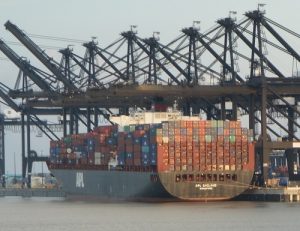US refiners ready to navigate waves of marine fuel changes
Steven Mcginn
02-May-2018
HOUSTON (ICIS)–With new marine fuel sulphur regulations about 1.5 years away, US refiners have geared up for the shift in ship fuel supply.
 Photo by Al
Greenwood
Photo by Al
Greenwood
By 1 January 2020, all marine traffic must use fuel with 0.5% or less sulphur content as part of the new International Maritime Organizations (IMO) standards.
That change will spur demand for distillates, such as ultra-low sulphur diesel (ULSD) fuel, and US refiners are well positioned to capture a firm share of the approximate 3m bbl/day global marine fuel market, according to observers.
“Because of regulations that have been made [here in the US], these new IMO regulations already set up [domestic refiners] well,” said John Auers, vice president at consultant group Turner Mason & Company.
Auers said distillates, including low-sulphur vacuum gasoil (LSVGO), can be chief replacement.
“LSVGO will be just as useful as replacement as distillate, but it can also be burned by ships,” Auers said. While the amount of distillate supplied will likely be reduced over time, the value of all low-sulphur fuels will go up, he added.
Across multiple US refiner’s earnings this quarter, company officials said distillate yields will be maximised.
“The industry is pointing to a lot more ULSD in the marine bunker business,” said Gary Simmons, Valero’s senior vice president of supply and operations.
According to its Q1 2018 earnings call, Phillips 66 processes 700,000 bbl/day of heavy crude, and for every $1/bbl discount for heavy crude against lighter grades, that will yield about a $250m in company earnings.
“Our existing refining assets are well positioned for this IMO transition, we’ve got a very high distillate yield,” said Phillips 66 CEO Greg Garland.
Garland added that the company expects to convert its refineries from maximum production of gasoline in the summer months, typically for heightened demand during the US driving season, to maximise diesel production in the summer months.
ExxonMobil said in its latest earnings that a hydrocracker at its Rotterdam refinery will take them out of lower-value products like high sulphur marine fuel oil and into fuels with higher value, such as ULSD.
“What we want to be in a position to do is to offer a suite of options for the marine industry, so we are going to positioned to provide things like low-sulphur blends,” said Jeff Woodbury, vice president of investor relations.
Refiners with heavy coking capacity will be best suited, but because every refinery has different capabilities, configurations play a different part, Auers added.
“If you [are running] a coking refinery on the US Gulf Coast, you’re looking at doing all you can to expand capacity,” Auers said.
Focus article by Steven McGinn
Global News + ICIS Chemical Business (ICB)
See the full picture, with unlimited access to ICIS chemicals news across all markets and regions, plus ICB, the industry-leading magazine for the chemicals industry.
Contact us
Partnering with ICIS unlocks a vision of a future you can trust and achieve. We leverage our unrivalled network of industry experts to deliver a comprehensive market view based on independent and reliable data, insight and analytics.
Contact us to learn how we can support you as you transact today and plan for tomorrow.
READ MORE

